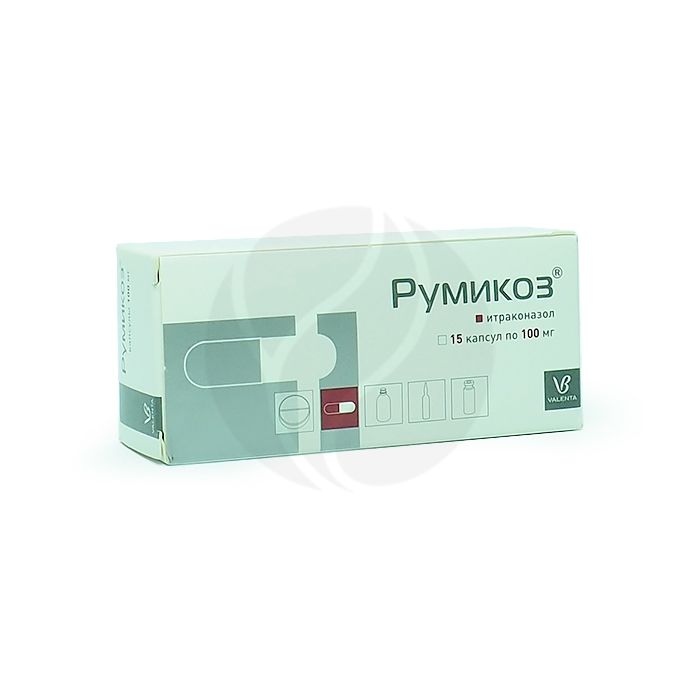Rumicosis capsules 100mg, No. 15
Expiration Date: 11/2025
Russian Pharmacy name:
Румикоз капсулы 100мг, №15
Vulvovaginal candidiasis
mycoses of the skin, oral cavity, eyes,
onychomycosis caused by dermatophytes and / or yeast,
systemic mycoses (including systemic aspergillosis, candidiasis, cryptococcosis, histoplasmosis, sporotrichosis, paracoccidioidosis, blastomycosis and other rare systemic and tropical mycoses).
Inside, 100 mg 1 time / day or 200 mg 1-2 times / day, the duration of treatment depends on the etiology of the disease.
Capsules with a white body and a pink-brown cap, size no. 0; the contents of the capsules are spherical microgranules from light yellow to yellowish beige.
1 caps.
itraconazole 100 mg
Excipients: hypromellose, poloxamer (lutrol), wheat starch, sucrose.
Simultaneous ingestion of terfenadine, astemizole, mizolastine, cisapride, dofetilide, quinidine, pimozide, simvastatin, lovastatin, midazolam or triazolam;
hypersensitivity to itraconazole.
pharmachologic effect
Triazole derivative antifungal agent. The mechanism of action is associated with the ability to inhibit cytochrome P450-dependent enzymes of sensitive fungi, which leads to disruption of the synthesis of ergosterol in the cell wall of the fungus. Has a broader spectrum of antifungal activity than ketoconazole. Active against Aspergillus spp., Blastomyces dermatitidis, Candida, Coccidioides immitis, Cryptococcus neoformans, Epidermophyton, Microsporum, Trichophyton, Histoplasma capsulatum, Malassezia furfur, Paracoccidioides brasiliensis, Spheniickii.
Pharmacokinetics
Therapeutic concentrations in the skin persist for 2-4 weeks after the end of the 4-week course of treatment. Itraconazole is determined in nail keratin a week after the start of treatment and persists for 6 months after the end of a 3-month course of therapy.
Side effect
From the side of the digestive system: abdominal pain, nausea, vomiting, constipation, increased activity of liver enzymes, cholestatic jaundice; in some cases - hepatitis.
From the side of the central nervous system and peripheral nervous system: headache, dizziness; in some cases, peripheral neuropathy.
From the side of the cardiovascular system: in some cases - edema, congestive heart failure and pulmonary edema.
Allergic reactions: skin rash, pruritus, urticaria, angioedema, Stevens-Johnson syndrome.
Others: with prolonged use - dysmenorrhea, hair loss, hypokalemia.
Application during pregnancy and lactation
During pregnancy, itraconazole is used only for systemic mycoses, when the expected effect of therapy outweighs the potential risk to the fetus.
Women of childbearing age are advised to use contraceptives while using itraconazole.
If necessary, use during lactation should decide on the termination of breastfeeding.
Experimental studies have shown that itraconazole has an embryotoxic effect and causes fetal anomalies.
Application for violations of liver function
Itraconazole should not be used in patients with liver disease. However, in cases of extreme necessity with cirrhosis of the liver, treatment with itraconazole is carried out under the control of its plasma level and with an appropriate dose adjustment.
With an increase in the activity of liver transaminases, itraconazole is used in cases where the expected benefit of therapy outweighs the possible risk of liver damage.
In the case of using itraconazole for more than 1 month, monitoring of liver function is necessary.
If symptoms of liver dysfunction develop during treatment, itraconazole should be discontinued.
Application for impaired renal function
In cases of extreme necessity in case of impaired renal function, treatment with itraconazole is carried out under the control of its plasma level and with an appropriate dose adjustment.
Application in children
There is currently insufficient data on the use of itraconazole in children.
special instructions
Should not be used in patients with symptoms of ventricular dysfunction and a history of congestive heart failure.
Itraconazole should not be used in patients with liver disease. However, in cases of extreme necessity with liver cirrhosis and / or impaired renal function, treatment with itraconazole is carried out under the control of its plasma level and with an appropriate dose adjustment.
With an increase in the activity of liver transaminases, itraconazole is used in cases where the expected benefit of therapy outweighs the possible risk of liver damage.
In the case of using itraconazole for more than 1 month, monitoring of liver function is necessary.
If symptoms of heart failure, liver dysfunction, peripheral neuropathy develop during treatment, itraconazole should be discontinued.
Itraconazole is used with caution in case of hypersensitivity to other azole derivatives.
Use in pediatrics
There is currently insufficient data on the use of itraconazole in children.
Drug interactions
Drugs that induce the induction of liver enzymes (rifampicin, phenytoin) can reduce the concentration of itraconazole in plasma.
With simultaneous use with drugs that reduce the acidity of gastric juice (including m-anticholinergics, antacids, blockers of histamine H2-receptors), itraconazole absorption may decrease.
With simultaneous use with drugs, the metabolism of which is carried out with the participation of CYP3A isoenzymes, an increase in the intensity and / or duration of their effects is possible. These drugs include terfenadine, astemizole, cisapride, midazolam, triazolam (for oral administration), indirect anticoagulants, cyclosporine, digoxin, calcium channel blockers, quinidine, vincristine.

